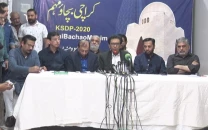The world according to a Pakistani
Events such as Osama's killings galvanised public opinion, where as Mukhtaran Mai's verdict split it in two camps.

There is a glaringly disproportionate reaction to the decision when compared to the media and public support accorded to Dr Aafia Siddiqui. Mukhtaran Mai, like Aasia Bibi, is not noteworthy enough. The good doctor, Blackwater, Raymond Davis, Osama and drone attacks have the ability to be incredibly galvanising, melting away ideological and political differences. Whereas Aasia Bibi, suicide attacks, the assassinations of Salmaan Taseer and Shahbaz Bhatti, Balochistan and Mukhtaran Mai do just the opposite by making the fault lines more pronounced and hence resulting in two camps, completely mismatched in numeric strength. There is an unmistakable method to this madness.
Mukhtaran Mai’s ordeal only becomes interesting when the role of the insidious NGOs, being funded by ‘foreign finances’ to corrupt the moral fabric of our society, is under consideration. Other than this particular aspect, the gang rape is just an ordinary, commonplace gang rape. The alleged perpetrators are local thugs, clearly identifiable and the crime is mundane. The gang rape is almost placid and unremarkable. It lacks the mystique and grandeur of Dr Siddiqui’s tribulation. Dr Siddiqui’s conviction is an affront to our national integrity, an insult to every Muslim; in short, it is war on Islam itself. The adversary in Dr Siddiqui’s case is a monster of Biblical proportions, sordid and baleful, symbolising the final frontier in the battle between truth and falsehood. It is all the infidel forces combined, determined to torment a faithful daughter of Pakistan, a symbol of resistance against heathen tyranny. Dr Siddiqui’s trial is cathartic, reassuring us that the misery surrounding us is not our own devise. The fact that Dr Siddiqui is an American citizen who was wandering in Afghanistan without an adequate reason and who has been incriminated in WikiLeaks cables is to be ignored.
Mukhtaran Mai’s case has no such therapeutic escape. It compels us to be introspective about the causes of our abysmal societal failures. More frighteningly, the origins are domestic, with no defence of a Hindu-Zionist conspiracy to relieve our culpability. The debacle leads us to inquire about the reasons for such wanton decadence, the authority and the role of jirgas who pass such atrocious judgements, the apathy of those who witness, the criminal justice system and numerous other similar dreary reasons. It also risks that someone in their naivety may even delve into general misogyny in our society. To the irreverent, the rationale for equating the testimony of two female witnesses with one male witness in certain financial matters might not be obvious. Some may even have the audacity to question the ineligibility of a woman to be a caliph or the requirement of four male pious witnesses for the awarding of Hadd punishment for rape. It would result in a complete breakdown of established social order. Additionally, the introspection seeks to apportion the blame on ourselves. We may find that the agents of the barbarism are not grotesque, far away, abstract entities conspiring against the integrity of Pakistan and the glory of Islam; they are venal, incurably violent and indigenous.
Drone attacks and Osama bin Laden’s killing can be condemned unequivocally, with theatrical despair, as attacks on the sovereignty of Pakistan by a foreign, evil country. The condemnation does not risk being particular. It comforts us by reinforcing our status as a victim. The permission granted for the drones to take off from Pakistan is irrelevant. Suicide attacks are distinctly more complicated. They cannot be denounced without careful clawback phrases, which also seek to sympathise with the suicide bombers, cast suspicion on Blackwater and deride America, India and the infidels generally. Criticising suicide attacks, without these precautions, risks acknowledging the role of our military establishment in nurturing these militants in the past, the presence of an ideology sanctioning this brutality and the existence of political apologists of this violence. Although honest, it is shamefully unpatriotic. In a similar vein, the turbulence in Balochistan should completely be attributed to India, America and, even, China. Osama bin Laden’s killing is to be condemned, yet our intelligence agencies and military should not be held responsible for their blatant complicity in harbouring terrorists. The murders committed by Raymond Davis are horrific and he should have been publicly stoned to death, whereas Mumtaz Qadri needs to be understood.
I agree that US imperialism is a major challenge and needs to be fought rationally and vigorously, yet it is no excuse for ignoring honest self-assessment. Raymond Davis should have been tried in Pakistan, not all drone attacks are justified and US interference in domestic matters should be condemned cogently, but that does not make terrorists heroes or victims. In Notes on Nationalism, George Orwell writes, “There is almost no kind of outrage — torture, which does not change its moral colour when it is committed by ‘our’ side.” Our politicians, and a certain segment of the media, very deliberately perpetuate this pathological culture of paranoia, exculpation and cowardice, exhibiting bogus bravado against distant enemies, while displaying craven ignorance at everything native. In Shakespeare’s Julius Caesar, Cassius says to Brutus, “The fault, dear Brutus, is not in our stars, but in ourselves, that we are underlings.”
Published in The Express Tribune, May 14th, 2011.



















COMMENTS
Comments are moderated and generally will be posted if they are on-topic and not abusive.
For more information, please see our Comments FAQ